
Nepenthes alata is a tropical pitcher plant endemic to the Philippines. Like all pitcher plants, it is carnivorous and uses its nectar to attract insects that drown in the pitcher and are digested by the plant. It is highly polymorphic, and its taxonomy continues to be subject to revisions.
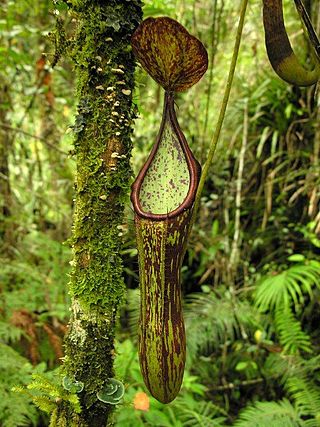
Nepenthes copelandii is a species of pitcher plant native to the island of Mindanao in the Philippines. Originally known from Mount Apo near Davao City and Mount Pasian near Bislig, it has since been discovered on a number of peaks throughout Mindanao. It may also be present on the nearby island of Camiguin. The species has a wide altitudinal distribution of 1100–2400 m above sea level. Nepenthes copelandii has no known natural hybrids. No forms or varieties have been described.
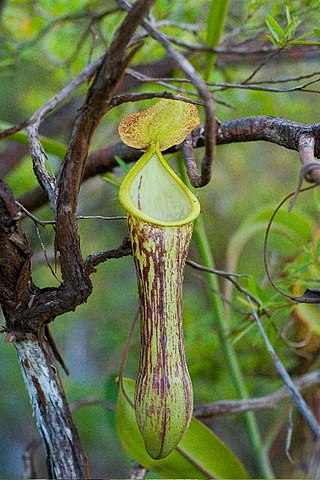
Nepenthes mindanaoensis is a tropical pitcher plant native to the Philippine islands of Mindanao and Dinagat.

Nepenthes philippinensis is a tropical pitcher plant endemic to the Philippines. It is known from Palawan and the neighbouring Calamian Islands and Linapacan, where it grows at 0–600 metres (2,000 ft) above sea level.
Nepenthes saranganiensis is a tropical pitcher plant native to the Philippine island of Mindanao. It is noted for its extremely decurrent leaf attachment that extends a large distance down the stem, often continuing into the next internode.
Martin Roy Cheek is a botanist and taxonomist at the Royal Botanic Gardens, Kew.

Nepenthes graciliflora is a tropical pitcher plant endemic to the Philippines. Long considered a synonym of N. alata, it was restored as a separate species in 2013 by Martin Cheek and Matthew Jebb. It has been recorded from the islands of Bohol, Leyte, Luzon, Mindanao, Mindoro, Panay, Samar, and Sibuyan, and following the redelimitation of N. alata is the most widespread Nepenthes species of the Philippines. It is known from mossy, submontane forest, generally at 800–1,280 metres (3,000–4,000 ft) altitude, though the type specimen from Sibuyan was collected at only 300 m (1,000 ft).
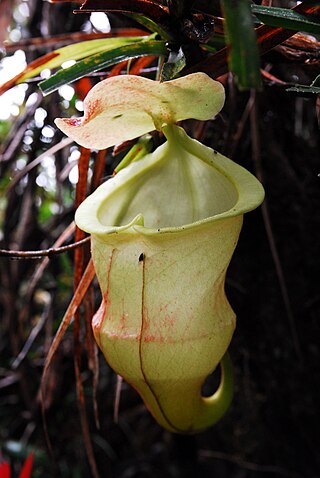
Nepenthes hamiguitanensis is a tropical pitcher plant endemic to a single peak on the Philippine island of Mindanao, where it grows at elevations of 1200–1600 m above sea level. Once thought to be a natural hybrid between N. micramphora and N. peltata, this plant is now considered a species of possible hybridogenic origin. It produces squat upper pitchers that vary greatly in pigmentation, from red speckled to yellow throughout.

Nepenthes ceciliae is a tropical pitcher plant endemic to the Philippine island of Mindanao, where it grows at 1500–1880 m above sea level. Its discovery was announced online in August 2011.

Nepenthes ramos is a tropical pitcher plant native to the northeastern Mindanao, Philippines. It is known from only a handful of herbarium specimens collected in 1919 at an elevation of 670 m above sea level. It likely grows in the forest on ultramafic soils.
Nepenthes negros is a tropical pitcher plant native to the Philippines, specifically the islands of Biliran and Negros.
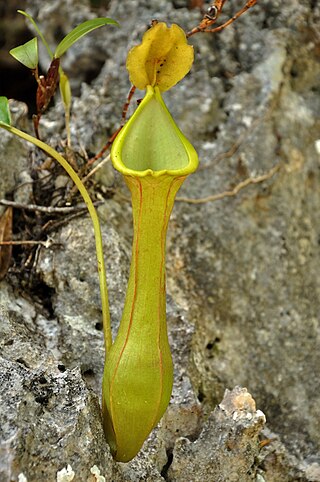
Nepenthes viridis is a tropical pitcher plant endemic to the Philippines. It is known only from coastal areas at low altitude and has been recorded from Dinagat, Samar, and a number of surrounding islets. It is closely allied to the N. alata group of species.

Nepenthes extincta is a tropical pitcher plant native to the Philippines. It is known only from Surigao del Sur, Mindanao, where it has been recorded at c. 400 metres (1,300 ft) altitude.

Nepenthes kitanglad is a tropical pitcher plant native to the Philippines. It is known only from Mount Kitanglad in Bukidnon Province, Mindanao, where it has been recorded as an epiphyte in mossy forest at 1800–2100 m altitude. This species belongs to the informal "N. alata group", which also includes N. alata, N. ceciliae, N. copelandii, N. extincta, N. graciliflora, N. hamiguitanensis, N. kurata, N. leyte, N. mindanaoensis, N. negros, N. ramos, N. saranganiensis, and N. ultra. These species are united by a number of morphological characters, including winged petioles, lids with basal ridges on the lower surface, and upper pitchers that are usually broadest near the base.
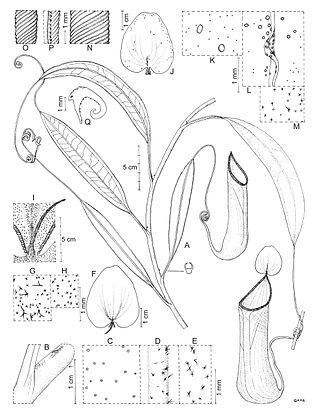
Nepenthes leyte is a tropical pitcher plant native to the Philippines. It appears to be endemic to the island of Leyte, after which it is named. It has been recorded from submontane mossy forest at 900 m altitude.

Nepenthes cornuta is a tropical pitcher plant native to the Philippines. It is known only from the Pantaron Mountain Range of central Mindanao, where it grows terrestrially on ultramafic soils at around 1000 m above sea level.

Nepenthes talaandig is a tropical pitcher plant native to the Philippines. It is known only from the Pantaron Mountain Range of central Mindanao, where it grows terrestrially on ultramafic soils at around 1000 m above sea level.













